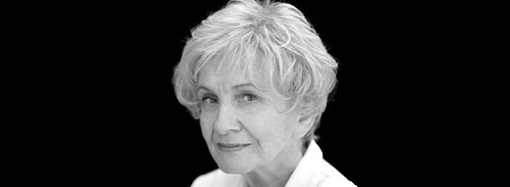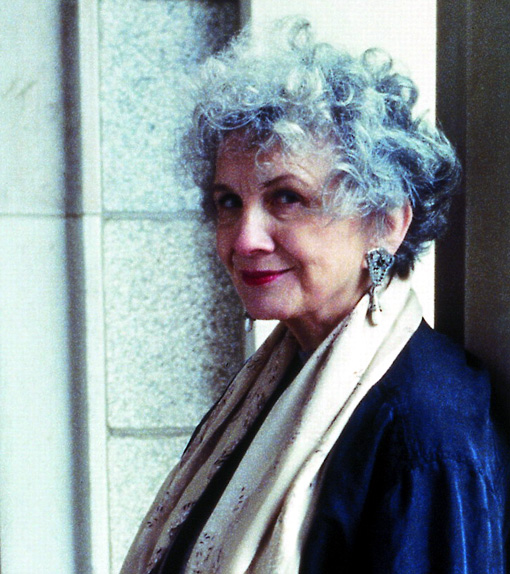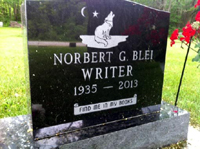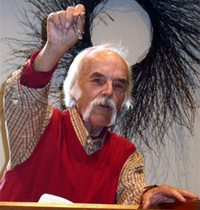
NOTES from the UNDERGROUND No. 198 | September 11, 2009
ALICE MUNRO
“Memory is the way we keep telling ourselves our stories – and telling other people a somewhat different version of our stories.”
–Alice Munro
Speaking of ‘character,’ a recent topic in the news that I would like to explore a little in regard to Alice Munro, also recently in the news, a Canadian writer of considerable consequence throughout the world. “Chekovian”, some critics would say, in her sense, sensibility, mastery of the short story form.
Often when I travel some distance, when I know I will be gone from days to weeks, the last thing I pack are books. Always a tough decision. Something to hold me over. Do I want to continue the works I am already reading, or do I want something new? Nonfiction, novels, poetry, short stories? Hardback or paper—probably paper, considering the weight if lugging books on planes, through airports, etc. Even more importantly: What books? What authors? I always grab some small press publications. I always take a smattering of poetry and fiction. I want surprise, enjoyment, thought provocation, full engagement. There’s nothing worse than dragging a book along that’s disappointing. So flat you want to leave it behind on the plane, and you do—or I have done on a number of occasions.
So when I’m running out of time, unsure of clear choices, inevitably I stick a ‘staple’ in my carry-on briefcase—often a collection of Alice Munro’s stories, which never fail me. I’m not exactly sure why this is, what it is about her stories that possesses me, but I always feel at home, find, in her, an old friend who is going to tell me something in ways nobody else can.
I would add (somewhat of a contradiction)…her short stories are not really short. In fact, they’re long, too damn long—sometimes twenty-five to fifty pages or more! They’re almost novellas—but they’re not that either. They’re a form of ‘short’ story strictly her own. They’re more like short-story-novels…such depths, so many scenes, settings, characters… Truly unique.
I started this piece discussing character. In fact, my original intention was to merely mention the news item below and say: Thank you, Alice Munro. One of a kind. Here in the literary land of ego-mania-Americana, I can’t imagine a single writer of Alice Munro’s stature who would say “No, that’s enough.” Such generosity of spirit, such sterling character. –Norbert Blei
![]()
Alice Munro Withdraws From Canadian Prize
Book lovers who were hoping for a decisive showdown between the authors Alice Munro…and Margaret Atwood in the Scotiabank Giller Prize, the annual Canadian literary award, were disappointed when Ms. Munro said she did not want to be considered for the prize this year, The Globe and Mail reported. Ms. Munro, whose new short-story collection, “Too Much Happiness,” was seen as a likely nominee, said that she was withdrawing the book from consideration because she has won the prize twice before — for her collections “The Love of a Good Woman” (in 1998) and “Runaway” (in 2004) — and younger writers should have a chance to win. Douglas Gibson, whose Douglas Gibson Books imprint releases Ms. Munro’s work in Canada, told The Globe and Mail:
“In my role as greedy publisher I pointed out that the Giller Prize produces so much publicity, that even to be nominated for it is tremendous publicity. But her mind is made up on this.” The Giller Prize, about $45,000, is awarded annually to a Canadian work of fiction; the long list of nominees for this year’s prize will be announced Oct. 6. “Too Much Happiness” is to be released in the United States in November.
“I want the reader to feel something is astonishing. Not the ‘what happens,’ but the way everything happens.”
–Alice Munro
 Alice Ann Munro ( born 10 July 1931) is a Canadian short-story writer, winner of the 2009 Man Booker International Prize for her lifetime body of work, and three-time winner of Canada’s Governor General’s Award for fiction. Generally regarded to be one of the world’s foremost writers of fiction, her stories focus on the human condition and relationships through the lens of daily life. While the locus of Munro’s fiction is Southwestern Ontario, her reputation as a short-story writer is international. Her “accessible, moving stories” explore human complexities in a seemingly effortless style. Munro’s writing has established her as “one of our greatest contemporary writers of fiction,” or, as Cynthia Ozick put it, “our Chekhov.”
Alice Ann Munro ( born 10 July 1931) is a Canadian short-story writer, winner of the 2009 Man Booker International Prize for her lifetime body of work, and three-time winner of Canada’s Governor General’s Award for fiction. Generally regarded to be one of the world’s foremost writers of fiction, her stories focus on the human condition and relationships through the lens of daily life. While the locus of Munro’s fiction is Southwestern Ontario, her reputation as a short-story writer is international. Her “accessible, moving stories” explore human complexities in a seemingly effortless style. Munro’s writing has established her as “one of our greatest contemporary writers of fiction,” or, as Cynthia Ozick put it, “our Chekhov.”
Alice Munro was born in the town of Wingham, Ontario into a family of fox and poultry farmers. Her father was Robert Eric Laidlaw and her mother, a school teacher, was Anne Clarke Laidlaw (née Chamney). She began writing as a teenager and published her first story, “The Dimensions of a Shadow,” while a student at the University of Western Ontario in 1950. During this period she worked as a waitress, tobacco picker and library clerk. In 1951, she left the university, in which she had been majoring in English since 1949, to marry James Munro and move to Vancouver, British Columbia. Her daughters Sheila, Catherine, and Jenny were born in 1953, 1955, and 1957 respectively; Catherine died 15 hours after birth. In 1963, the Munros moved to Victoria where they opened Munro’s Books. In 1966, their daughter Andrea was born.
Alice Munro’s first collection of stories, Dance of the Happy Shades (1968), was highly acclaimed and won that year’s Governor General’s Award, Canada’s highest literary prize. This success was followed by Lives of Girls and Women (1971), a collection of interlinked stories that was published as a novel.
Alice and James Munro were divorced in 1972. She returned to Ontario to become Writer-in-Residence at the University of Western Ontario. In 1976 she married Gerald Fremlin, a geographer. The couple moved to a farm outside Clinton, Ontario. They have since moved from the farm to a house in the town of Clinton.
In 1978, Munro’s collection of interlinked stories, Who Do You Think You Are?, was published (titled The Beggar Maid: Stories of Flo and Rose in the United States). This book earned Munro the Governor General’s Literary Award for a second time. From 1979 to 1982, she toured Australia, China and Scandinavia. In 1980 Munro held the position of Writer-in-Residence at both the University of British Columbia and the University of Queensland. Through the 1980s and 1990s, Munro published a short-story collection about once every four years to increasing acclaim, winning both national and international awards.
In 2002, her daughter Sheila Munro published a childhood memoir, Lives of Mothers and Daughters: Growing Up With Alice Munro.
Alice Munro’s stories frequently appear in publications such as The New Yorker, The Atlantic Monthly, Grand Street, Mademoiselle, and The Paris Review. In interviews to promote her 2006 collection The View from Castle Rock, Munro suggested that she would, perhaps, not publish any further collections. She has since recanted and published further work. Her latest collection, Too Much Happiness, was published in August 2009.
Her story “The Bear Came Over the Mountain” has been adapted for the screen and directed by Sarah Polley as the film Away from Her, starring Julie Christie and Gordon Pinsent. It successfully debuted at the 2006 Toronto International Film Festival. Polley’s adaptation was nominated for an Academy Award for Best Adapted Screenplay, but lost to No Country for Old Men.
Many of Munro’s stories are set in Huron County, Ontario. Her strong regional focus is one of the features of her fiction. Another is the all-knowing narrator who serves to make sense of the world. Many compare Munro’s small-town settings to writers of the U.S. rural South. As in the works of William Faulkner and Flannery O’Connor, her characters often confront deep-rooted customs and traditions. However, the reaction of Munro’s characters is less intense than their Southern counterparts’. Thus, particularly with respect to her male characters, she may be said to capture the essence of everyman. Her female characters, though, are more complex. Much of Munro’s work exemplifies the literary genre known as Southern Ontario Gothic.
Munro’s work is often compared with the great short story writers. For example, the American writer Cynthia Ozick called Munro “our Chekhov.” In Munro stories, as in Chekhov’s, plot is secondary and “little happens.” As with Chekhov, Garan Holcombe notes: “All is based on the epiphanic moment, the sudden enlightenment, the concise, subtle, revelatory detail.” Munro’s work deals with “love and work, and the failings of both. She shares Chekhov’s obsession with time and our much-lamented inability to delay or prevent its relentless movement forward.”
A frequent theme of her work—particularly evident in her early stories—has been the dilemmas of a girl coming of age and coming to terms with her family and the small town she grew up in. In recent work such as Hateship, Friendship, Courtship, Loveship, Marriage (2001) and Runaway (2004) she has shifted her focus to the travails of middle age, of women alone and of the elderly. It is a mark of her style for characters to experience a revelation that sheds light on, and gives meaning to, an event.
Munro’s spare and lucid language and command of detail gives her fiction a “remarkable precision,” as Helen Hoy observes. Munro’s prose reveals the ambiguities of life: “ironic and serious at the same time,” “mottoes of godliness and honor and flaming bigotry,” “special, useless knowledge,” “tones of shrill and happy outrage,” “the bad taste, the heartlessness, the joy of it.” Her style places the fantastic next to the ordinary with each undercutting the other in ways that simply, and effortlessly, evoke life. As Robert Thacker notes:
Munro’s writing creates … an empathetic union among readers, critics most apparent among them. We are drawn to her writing by its verisimilitude—not of mimesis, so-called and… ‘realism’—but rather the feeling of being itself… of just being a human being.
Many critics have asserted that Munro’s stories often have the emotional and literary depth of novels. The question of whether Munro actually writes short-stories or novels has often been asked. Alex Keegan, writing in Eclectica, has a simple answer: “Who cares? In most Munro stories there is as much as in many novels.”
Works
- * Dance of the Happy Shades – 1968 (winner of the 1968 Governor General’s Award for Fiction)
- * Lives of Girls and Women – 1971
- * Something I’ve Been Meaning to Tell You – 1974
- * Who Do You Think You Are? – 1978 (winner of the 1978 Governor General’s Award for Fiction)
- * The Moons of Jupiter – 1982 (nominated for a Governor General’s Award)
- * The Progress of Love – 1986 (winner of the 1986 Governor General’s Award for Fiction)
- * Friend of My Youth – 1990 (winner of the Trillium Book Award)
- * Open Secrets – 1994 (nominated for a Governor General’s Award)
- * Selected Stories – 1996
- * The Love of a Good Woman – 1998 (winner of the 1998 Giller Prize)
- * Hateship, Friendship, Courtship, Loveship, Marriage – 2001
- * No Love Lost – 2003
- * Vintage Munro – 2004
- * Runaway – 2004 (winner of the 2004 Giller Prize) ISBN 1-4000-4281-X
- * The View from Castle Rock – 2006
- * Too Much Happiness – 2009
Awards and honours
Awards
- * Governor General’s Award for English-language Fiction (Canada) – 1968, 1978, 1986
- * Canadian Booksellers Award for Lives Of Girls And Women (1971)
- * Marian Engel Award (1986)
- * Shortlisted for the annual (UK) Booker Prize for Fiction (now the ‘Man Booker Prize’) (1980) for The Beggar Maid
- * WH Smith Literary Award (1995, UK) for Open Secrets
- * National Book Critics Circle Award (1998, U.S.) For The Love of a Good Woman
- * PEN/Malamud Award for Excellence in Short Fiction (1997)
- * Rea Award for the Short Story (2001) given to a living American or Canadian author.
- * Libris Award
- * Canada-Australia Literary Prize
- * Commonwealth Writers Prize Regional Award for Canada and the Caribbean.
- * Trillium Book Award (1990)
- * WH Smith Literary Award (1995)
- * Giller Prize (1998 and 2004)
- * O. Henry Award for Continuing Achievement in Short Fiction in the U.S. (2004) For Passion first published in The New Yorker, March 22, 2004 and What Do You Want To Know For Published in The American Scholar (2008)
- * Man Booker International Prize (2009, UK)
Honors
- * Royal Society of Canada’s Lorne Pierce Medal (1993)
- * Foreign Honorary Member of the American Academy of Arts and Letters (1992)
- * Medal of Honor for Literature from the U.S. National Arts Club (2005)





























































Leave a comment